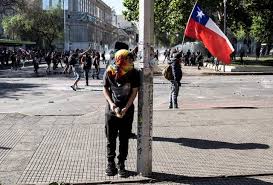As announced in The Costa Rica News (TCRN) a few days ago, COP25 would be taking place in Chile to discuss the appropriate issues regarding climate change. However, it is being proposed from the Ecological Federation (FECON) that the activity (UN Conference on Climate Change – COP25) must be carried out within a framework of total respect for Human Rights; the same office of the United Nations High Commissioner has pointed out since 2014, the inescapable relationship between the Climate discussion and Human Rights.
Why the scope of respect is mentioned, mainly because of the situation that has been taking place in Chile since October 18th. The Chilean army is violently repressing the peaceful demonstrations of the poorest citizens against the high cost of living and unjust taxes.
Already there have been more than 20 people killed, 2,500 arrests among them (250 children and adolescents and 500 women.), 400 wounded, at least 200 from police firearms; Dozens of raped women and hundreds of missing persons are the balance of the State of Emergency in Chile. Therefore, it is totally contradictory that the Chilean Government, while Human Rights are being violated, still intends to celebrate COP25.

The Government of Costa Rica must make a strong call to the Government of Sebastián Piñera and express the decision to suspend its participation in the COP25, as long as the State of Emergency situation and the repression of the protesters continue. In that sense, French deputy Alexis Corbière has asked the government of France to suspend participation in the COP25 in Chile due to these acts of repression.
Costa Rican legislators have stated in different media outlets that “you can’t talk about ecology if a government orders its people to be shot, Carlos Alvarado must demonstrate a true commitment to Human Rights by pointing out his disapproval of the repression episodes against protesters in Chile”.
Justice in Chile

In this Latin American country, unfortunate events full of violence and repression have been carried out by the government and the security forces against the people of that country protesting the strong economic inequalities imposed on them.
These mobilizations demand a better quality of life and equity. Chilean social organizations point out that the vast majority of these protests have been peaceful but are brutally repressed. One of the major causes of popular discontent is the rise in subway prices. But the complaints in Chilean streets are a long list of policies that benefit economic elite: privatized pensions, several cases of corruption between the political class and private ownership of the water system in the midst of a severe 10-year drought.
Chilean Social Organizations denounce that these episodes of state violence had not been seen since the last brutal military dictatorship imposed by Augusto Pinochet, a regime that began in 1973 and ended in 1991. As reported by the National Association of Rural and Indigenous Women (ANAMURI).
Human rights and climate change
In its 5th Evaluation Report (2014), the Intergovernmental Panel on Climate Change (IPCC), unequivocally confirmed that climate change is real and that greenhouse gas emissions are the product of human activity, with major phenomena directly and indirectly threatening the full and effective enjoyment of a wide range of human rights by many people throughout the world, including the rights to a dignified life, water and sanitation, food, health, housing, self-determination, culture and development.
The Human Rights Council (HRC), its Special Procedures mechanisms and the Office of the High Commissioner for Human Rights have tried to draw public attention again to the links between climate change and human rights through a set of resolutions, reports and activities related to the subject, as well as through the promotion of a human rights strategy to address it.
The Chilean government spokeswoman, Cecilia Pérez, said at a press conference that the plans for the APEC Forum (November 16 and 17) and COP25 (December 2 to 13) events “had not been altered.” This COP has generated expectations due to the growing marches for climate action led by Greta Thunberg, who announced her participation in the summit. Greta Thunberg is a Swedish environmental activist, who is 16 years old and has remained focused on the risks posed by climate change.
Given all this situation and demands presented here, we at TCRN are hopeful that these negative actions and situations decrease and stop harming the world population.

